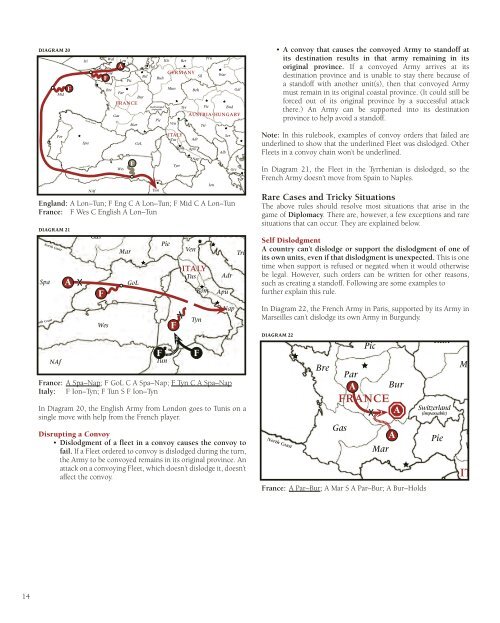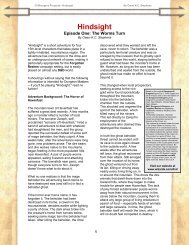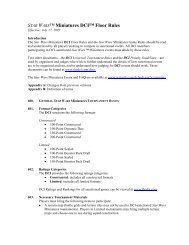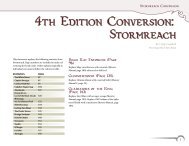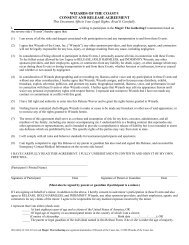Diplomacy Rulebook - Wizards of the Coast
Diplomacy Rulebook - Wizards of the Coast
Diplomacy Rulebook - Wizards of the Coast
You also want an ePaper? Increase the reach of your titles
YUMPU automatically turns print PDFs into web optimized ePapers that Google loves.
DIAGRAM 20<br />
F<br />
F<br />
A<br />
• A convoy that causes <strong>the</strong> convoyed Army to stand<strong>of</strong>f at<br />
its destination results in that army remaining in its<br />
original province. If a convoyed Army arrives at its<br />
destination province and is unable to stay <strong>the</strong>re because <strong>of</strong><br />
a stand<strong>of</strong>f with ano<strong>the</strong>r unit(s), <strong>the</strong>n that convoyed Army<br />
must remain in its original coastal province. (It could still be<br />
forced out <strong>of</strong> its original province by a successful attack<br />
<strong>the</strong>re.) An Army can be supported into its destination<br />
province to help avoid a stand<strong>of</strong>f.<br />
A<br />
F<br />
F<br />
England: A Lon–Tun; F Eng C A Lon–Tun; F Mid C A Lon–Tun<br />
France: F Wes C English A Lon–Tun<br />
DIAGRAM 21<br />
F<br />
F<br />
2<br />
F<br />
Note: In this rulebook, examples <strong>of</strong> convoy orders that failed are<br />
underlined to show that <strong>the</strong> underlined Fleet was dislodged. O<strong>the</strong>r<br />
Fleets in a convoy chain won’t be underlined.<br />
In Diagram 21, <strong>the</strong> Fleet in <strong>the</strong> Tyrrhenian is dislodged, so <strong>the</strong><br />
French Army doesn’t move from Spain to Naples.<br />
Rare Cases and Tricky Situations<br />
The above rules should resolve most situations that arise in <strong>the</strong><br />
game <strong>of</strong> <strong>Diplomacy</strong>. There are, however, a few exceptions and rare<br />
situations that can occur. They are explained below.<br />
Self Dislodgment<br />
A country can’t dislodge or support <strong>the</strong> dislodgment <strong>of</strong> one <strong>of</strong><br />
its own units, even if that dislodgment is unexpected. This is one<br />
time when support is refused or negated when it would o<strong>the</strong>rwise<br />
be legal. However, such orders can be written for o<strong>the</strong>r reasons,<br />
such as creating a stand<strong>of</strong>f. Following are some examples to<br />
fur<strong>the</strong>r explain this rule.<br />
In Diagram 22, <strong>the</strong> French Army in Paris, supported by its Army in<br />
Marseilles can’t dislodge its own Army in Burgundy.<br />
DIAGRAM 22<br />
France: A Spa–Nap; F GoL C A Spa–Nap; F Tyn C A Spa–Nap<br />
Italy: F Ion–Tyn; F Tun S F Ion–Tyn<br />
A<br />
In Diagram 20, <strong>the</strong> English Army from London goes to Tunis on a<br />
single move with help from <strong>the</strong> French player.<br />
2<br />
A<br />
Disrupting a Convoy<br />
• Dislodgment <strong>of</strong> a fleet in a convoy causes <strong>the</strong> convoy to<br />
fail. If a Fleet ordered to convoy is dislodged during <strong>the</strong> turn,<br />
<strong>the</strong> Army to be convoyed remains in its original province. An<br />
attack on a convoying Fleet, which doesn’t dislodge it, doesn’t<br />
affect <strong>the</strong> convoy.<br />
France: A Par–Bur; A Mar S A Par–Bur; A Bur–Holds<br />
A<br />
14


